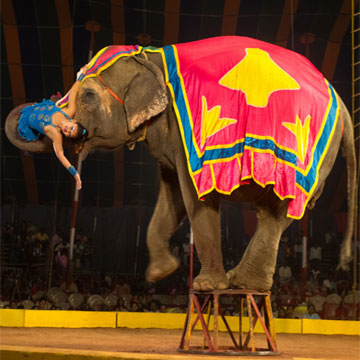 New Delhi:
New Delhi: She's a former Director of the National School of Drama (NSD) and has staged a play in a circus tent to focus attention on the dying "genre". Anuradha Kapur laments that after their licenses began to be cancelled, circuses attempted to reinvent themselves but died in the process.
Still, not all is lost as a circus school could help revive the genre, Kapur noted.
While the Central Zoo Authority (CZA) has been cancelling its recognition to circuses for a while, it delivered a body blow on December 6, 2016, cancelling its recognition to 21 circuses for keeping animals.
This implied that all circuses (except Ajanta circus, which is also under scrutiny) can no longer use wild animals. The CZA had passed these orders after official inspections in which cruelty to animals was reported.
"I think it (the circus industry) had a very big jolt after animals were barred. It was then time for the circuses to reinvent themselves. That was the period when this idea thrilled many of us. After that, humans were required to do what was earlier only one half of the act," Kapur told IANS in an interview.
"But in the process of reinventing itself, our circus has also died. The Indian circus could never rise up again," added Kapur, who received a Sangeet Natak Akademy award for threatre in 2004 and helmed the NSD for six years.
"When they were taken away, it seemed as if everything that the circus was all about had been taken away but there has been a reinvention. This reinvention has mainly been in the performers and also in performing languages," she said.
Kapur, along with actress Lillete Dubey, had curated "Talatum", a contemporary adaptation of Shakespeare's "The Tempest". Set in a circus tent, the play was performed using circus and other subaltern theatrical practices at the recently-concluded Serendipity Arts Festival in Goa.
"Returning to circuses has been a nostalgic affair. It seems like I have known it, that it was a part of my childhood and I am once again a child. There is obviously some pull in the circuses that we all feel and it is not just about nostalgia but also about the future. What are we going to do to revive the circus," Kapur wondered.
"We have seen the extent to which NSD has promoted theatre in the country and, in the similar manner, if there is a circus school, it will have a positive impact the current scenario. People who want to be circus artists will no longer feel that they can only learn informally from their peers and friends, but they will have institutional support.
"Also once circus gets recognised as an 'art', then funding, opportunities and other windows will open instantly. What has happened to the circus is that it has (been) at the edges of high art, it is not seen as an art but something else. But it is an art form, it has mixtures which other contemporary arts do not have," Kapur contended.
Kapur said she fondly cherishes memories of circuses from her childhood when it was almost customary for the Great Indian Circus and Grand Circus to perform in Delhi.
"The most exciting thing about the circus is the connection and calling that the audiences establish with the performers, who are giving everything of themselves, including risking their lives in very dangerous acts. I think it is like a little life story -- the little highs and lows of life -- are all shown in a circus."
Reflecting on the poor state of livelihood for most circus artistes, Kapur asked where do they book their tickets to after a circus is over?
"They do not have a home, they are always on a move like nomads. For them livelihood is really dependent on short term and long term contracts. Some of them, like jugglers, will go from one city to another performing at several events but a consistent employment is what they do not have. Earlier they were booked for longer periods, many of them were also constantly employed but it is not so today," Kapur said.
 New Delhi: She's a former Director of the National School of Drama (NSD) and has staged a play in a circus tent to focus attention on the dying "genre". Anuradha Kapur laments that after their licenses began to be cancelled, circuses attempted to reinvent themselves but died in the process.
New Delhi: She's a former Director of the National School of Drama (NSD) and has staged a play in a circus tent to focus attention on the dying "genre". Anuradha Kapur laments that after their licenses began to be cancelled, circuses attempted to reinvent themselves but died in the process.